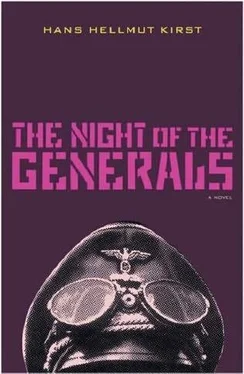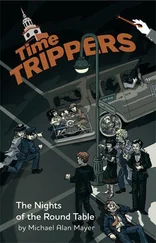Meanwhile, von Seydlitz-Gabler rang Kahlenberge and informed him, with an unmistakable note of self-congratulation in his voice, of General Tanz’s forthcoming visit. “He wasted no time in accepting my invitation. I should welcome it if you could turn up at my suite for coffee, any time after two.”
Kahlenberge thanked him and promptly rang Prévert. “Tanz is arriving about midday,” he told him.
Prévert asked for details and Kahlenberge repeated his conversation with von Seydlitz-Gabler word for word. “That’s all I know at the moment, but it’s good enough for the time being. I’ll be seeing Tanz shortly after two, then. Is there any special way you want me to behave?”
“Just help to create as pleasant an atmosphere as possible.”
“I’m afraid I won’t find it easy.”
“Try to all the same, mon cher. I want Tanz to feel at home.”
“Like a donkey on thin ice, you mean?”
Prévert chuckled. He was familiar with most of the German proverbs and admired their applicability to any given situation. “I should be greatly obliged if you could arrange a small party this evening—a rather select affair, you understand.”
“I’m crazy about parties,” Kahlenberge said caustically.
Rainer Hartmann, domiciled in Antibes and, according to his passport, a French national, had returned to Berlin at last. He was walking on air and everyone seemed to be in step with him. Even the buildings smiled down on him kindly, and the sky was bright. Hartmann felt happy.
Virtually the first person he had met in Berlin was Ulrike, who had apparently been seeing someone off at the airport. “It’s almost too good to be true!” he exclaimed joyfully, and Ulrike felt like a traitress for not disillusioning him there and then. The years melted away as they talked, until what had once been seemed to have happened only yesterday. Ulrike and he suddenly became the focal point of the universe, wreathed in a golden haze of memories.
Hartmann spent the night at the Pension Phoenix, a night filled with roseate dreams of the future. He awoke to find that the weather matched his mood. Ulrike joined him for breakfast, during which they drank champagne and held hands under the table, chattering away happily like carefree children playing truant from school. It was a glorious day outside, with a sky that looked like a lavish flower arrangement in pastel shades.
After breakfast, Hartmann and Ulrike walked arm in arm to the nearest underground station. They got out in the vicinity of the Iderfenngraben, where Hartmann deposited Ulrike in a neighbouring bar and ordered her—at ten-thirty in the morning—a beer and a schnapps. Then he hurried round the corner and ran excitedly up the four flights of stairs that led to his aunt’s flat.
Aunt Grete was the pride and joy of the family. She had been lucky enough to find a husband who adored her unstintingly. They had ten or twelve children at a rough count, and the family was a living example of the old saying that children are a form of wealth. Since three or four of them were already earning, the weekly income of the household which Aunt Grete administered so indefatigably was considerable.
Hartmann’s old mother was waiting for him. He held her at arm’s length for a moment, studying her face as though he had never seen it before. She was thin and grey, and her cheeks were seamed with a multitude of fine wrinkles, but her eyes were still as blue and serene as a mountain lake on a day in midsummer.
They hugged each other without speaking, surrounded by the younger members of Aunt Grete’s family. A baby crawled under their feet, a small boy gazed at them with rapt attention, and a girl of about school-leaving age looked as though she intended to smother Hartmann with cousinly caresses. He was hard put to it to keep his feet under such a violent onslaught of affection. Oblivious to what was being said, he held his mother’s hand and revelled in the cosy warmth enclosing him as the children clustered round. At least two of them perched on his knees, and the adolescent girl hung over the back of his chair with her arms round his neck.
“You must be hungry,” said his mother. “Children are always hungry.”
“Yes, always!” clamoured half a dozen voices.
Aunt Grete had baked a monster cake in his honour and laid out an array of cold meat, sausage and jellied eel. Encircled by dishes, Hartmann began to tuck in, urged on by the children, who knew that the left-overs would belong to them. Today was a red-letter day!
“Thank you for your telegram,” said Hartmann. He stroked his mother’s arm, dividing his attention between her and the jellied eel. “What a wonderful spread! I haven’t been so spoilt since I was a boy. My God, I feel good! But you know what would be real heaven? How about frying me a couple of potato pancakes?”
“As many as you like,” Aunt Grete replied promptly.
A few of the children looked disappointed. They had potato pancakes at least once a week.
“What telegram do you mean, Rainer?” asked his mother.
Hartmann looked perplexed. “You sent me one, didn’t you?” A tempting aroma came from the heaped dishes before him, but for the moment all he wanted was an answer to his question.
“No.”
A brooding expression came over Hartmann’s face. He tasted everything that was set before him, stuffing himself with food he didn’t really want and temporarily yielding to the notion that he could eat his way back into the halcyon days of his boyhood, dish by dish.
“Never mind,” he sighed between mouthfuls. “I’m happy to be here with you, that’s all that matters.”
At length he took his leave, promising to come back very soon—if not that evening, certainly at lunch-time next day. He held his mother close, pressing his cheek against hers, while a dozen childish hands plucked at his sleeve. Aunt Grete looked on with a contented smile, satisfied that she had warded off starvation for a few hours.
Hartmann hurried back to the bar, where Ulrike had ordered herself another beer and was still waiting patiently. She looked tired but happy. “Well, aren’t you glad you came?” she asked.
“Of course,” Hartmann replied automatically. His face had darkened as though a thin veil had been drawn across it. “But there’s something queer going on. You know that telegram I got from my mother? She says she never sent one. I don’t know what to think.”
“Maybe she misunderstood you.” Ulrike sensed that this was the moment Prévert had warned her about. “Perhaps she didn’t understand what you meant—or you misunderstood her.”
“The fact remains that she says she didn’t send me a telegram.”
“Did you discuss it with her?”
“Of course not. I didn’t want to upset her. She was so happy to see me.”
“Perhaps that’s the answer,” Ulrike said persuasively. “You didn’t question her thoroughly enough. The telegram needn’t necessarily have been sent by your mother—it could have been your uncle or aunt, or one of the neighbours. There are any number of explanations. I don’t see the slightest reason for you to worry.”
“All the same, maybe I ought to leave Berlin straight away.” Hartmann sounded morose. “There’s something going on. I can feel it in my bones.”
“Cheer up, darling!” Ulrike smiled at him fondly. “Look outside—it’s a glorious day, you’re back in Berlin, and I’m here with you. What more do you want?”
The meeting scheduled for noon in Commissioner Karpfen’s office opened harmoniously enough. It broke up barely an hour later in an atmosphere of strident discord. Those present, apart from Karpfen, were Prévert of Paris, Liesowski of Warsaw and Liebig of Dresden.
Karpfen was determined not to miss this exchange of views, which promised to provide a welcome break from his otherwise arid routine.
Читать дальше












